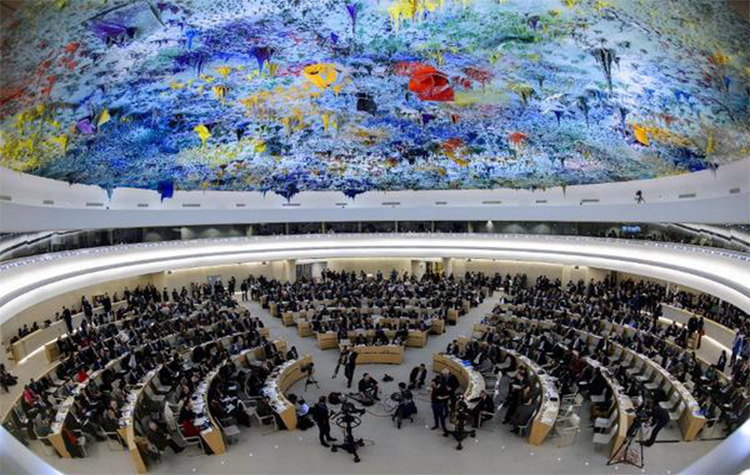Item 3: Promotion and Protection of all Human Rights, Civil, Political, Economic, Social and Cultural Rights, including the Right to Development – Interactive Dialogue with the Special Rapporteur on the promotion and protection of human rights and fundamental freedoms while countering terrorism
Oral Statement Delivered by Ms. Gayoon Baek on Behalf of
People’s Solidarity for Participatory Democracy (PSPD) and MINBYUN-Lawyers for a Democratic Society
Thursday, 10 March 2016
Thank you, Mr. President. People’s Solidarity for Participatory Democracy (PSPD) makes this statement jointly with MINBYUN-Lawyers for a Democratic Society, on behalf of 52 South Korean NGOs.
We welcome the report of the Special Rapporteur on the promotion and protection of human rights and fundamental freedoms while countering terrorism (A/HRC/31/65) and share the view that countering violent extremism must focus on addressing the underlying causes, while more repressive, security-based approaches would have the reverse effect. Counter-terrorism and national security measures have tightened around the world, which has resulted in undue attempts to illegally or arbitrarily limit fundamental rights and freedoms.
The Counter-Terrorism Act enacted in the Republic of Korea on 2 March 2016, is a disturbing example. The Republic of Korea already has an established system to address “terrorism” spread over various laws and instruments, including the National Security Act, Aviation Safety and Security Act, and Act on Prohibiting Against the Financing of Acts of Threats and Expansion of Weapons of Mass Destruction against General Public. While the long-standing criticisms and concerns on the National Security Act continue and remain unaddressed, as it is viewed to be a law that restrict the work of human rights defenders, the new Counter-Terrorism Act will only serve to further violate the freedom of expression and right to privacy.
The broad and vague definition of “terrorism” and “terrorist” in the Act can result in arbitrary interpretation. According to article 2(3) of the Act, a “potential terrorist” includes anyone “who is reasonably believed to have prepared, conspired, propagated, or incited terrorism.”, without a clear reference on the process of assigning and delisting a potential terrorist. This is particularly concerning, considering that the Government has many times labeled peaceful protests as “acts of terror” and a lack of a minimum safeguard for de-listing.
In addition, the Act strengthens the authority of the National Intelligence Service (NIS) to an unprecedented level. Under the Act, once listed as a potential terrorist, the NIS can extensively collect personal information, including sensitive information and location data, wiretap, tail, and even apply financial sanctions. The NIS has been well known for violating human rights even before this power is given, such as the illegal intervention to the 2012 Presidential Election and false accusation against a DPRK defector of espionage in 2014. Considering that safeguards to manage and monitor such abuse of power are highly insufficient, we note with grave concern that this new legislation will be a tool to facilitate illegal intervention to people’s private life.
Therefore, we would like to ask the Special Rapporteur:
– What kind of consultations should the State have with relevant stakeholders before enacting the Counter-terrorism Act?
Also, we would like to recommend the Government of the Republic of Korea:
– Immediately repeal the Counter-Terrorism Act
– Establish strong measures to prevent abuse of power by the Government body who is in charge of counter-terrorism
Thank you.
This statement is endorsed by below 52 South Korean NGOs:
Alliance for Enactment of Anti-Discrimination Act, Ansan Labor and Human Rights Center, Buddhism Human Rights Committee, Catholic Human Rights Committee, Cheongju Labor Human Rights Center, Cultural Action, DASAN Human Rights Center, Democratic Legal Studies Association, Disability and Human Rights in Action, Disabled People’s International Daegu, Geochang Peace and Human Rights Art Festival Commission, Gwangju Human Rights Activities Center, Human Rights Education Center ‘Deul’, Human Rights Education Center OnDa, Human Rights Movement Space ‘Hwal’, Human Rights Solidarity for New Society, Incheon Human Rights Film Festival, Joint Committee with Migrants in Korea, Korea HIV/AIDS Network of Solidarity KANOS, Korea Institute of Labor Safety and Health, Korean Confederation of Trade Unions, Korean Contingent Workers’ Center, Korean Council for Democratic Martyr, Korean Gay Men’s Groups ‘Chingusai’, Korean House for International Solidarity, Korean Progressive Network ‘Jinbonet’, Korean Sexual-Minority Culture and Rights Center, Labor Attorneys for Labor Rights, Lesbian Counseling Center in South Korea, Migrants Human Rights Solidarity, MINBYUN-Lawyers for a Democratic Society, Minkahyup Human Rights Group, Network of Accessible Environment for All, Palestine Peace and Solidarity in South Korea, Peace and Human Rights Center in Jeju, People’s Solidarity for Participatory Democracy, People’s Solidarity for Social Progress, Samsung Labor Watch, SARANGBANG Group for Human Rights, Seoul Human Rights Film Festival, Solidarity against Disability Discrimination, Solidarity for HIV/AIDS Human Rights Nanuri+, Solidarity for LGBT Human Rights of Korea, Solidarity for Peace & Human Rights, Supporters for the Health And Rights of People in the Semiconductor industry, SHARPS, The Committee to Support Imprisoned Workers, The National Council of Churches in Korea Human Rights Center, The Research Institute of the Differently Abled People Rights in Korea, Ulsan Solidarity for Human Rights, Women with Disabilities Empathy, Won Buddhism Human Rights Committee, World Without War




